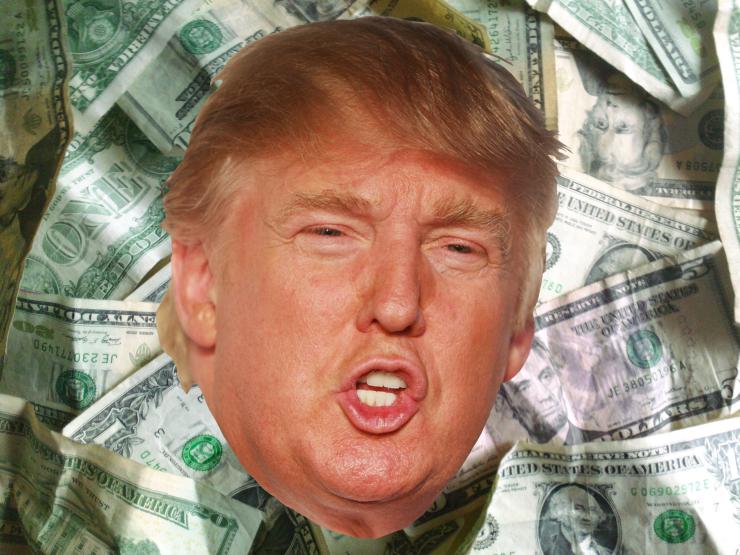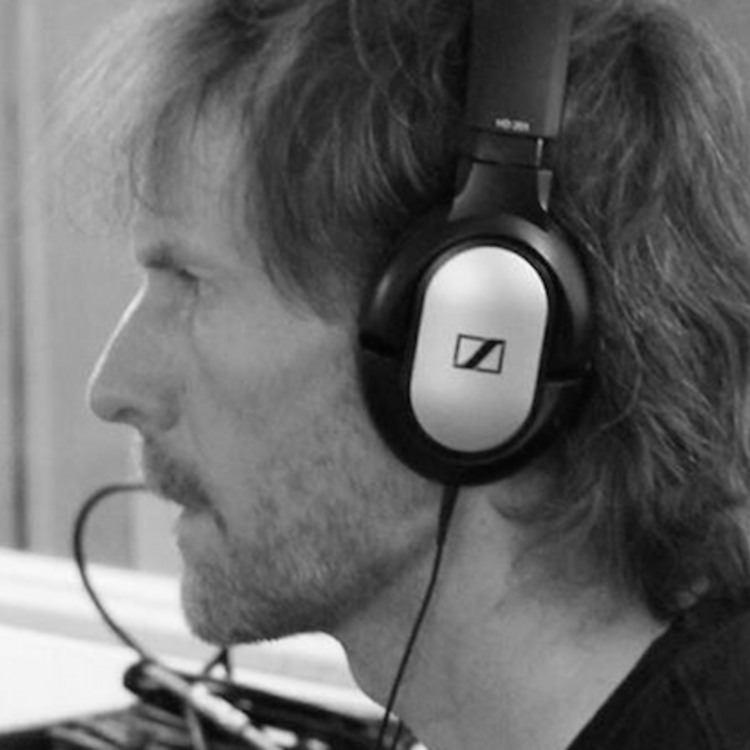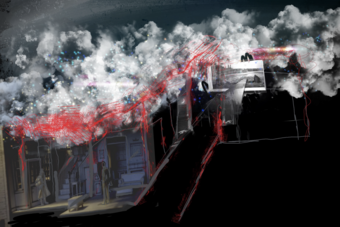Trumped by the Artless
Recently, while loading a huge 1920s desk and an elephant chair—yes, an actual royal chair used for riding on elephants—into a U-Haul truck at midnight, I began to question my life choices. I was co-producing a low budget film called Thirst that I'd co-written, so I was indirectly doing what I loved doing, but I was also hauling an entire truckful of insanely heavy movie props at midnight. I have a wife and three children—all of whom I homeschool, for God's sakes—and yet I'd barely seen them from the moment I'd stumbled out of bed until I'd found myself in this U-Haul.
I would contend that art, insight, beauty, and wit are a part of the cure for all of these societal ills—perhaps even for Donald Trump's ability to appeal to what is worst in us.
My wife was sweating it out with me, which constituted our quality time for the day, both of us nearly blind with exhaustion, and we'd have to blunder out of bed early the next day to earn the money that was helping us to 1. fund this independent short film and 2. feed, clothe, and shelter our kids. And the film's to-do list was still an endless scroll.
The elephant chair, struggling to meet my family's financial and emotional needs, the knee-buckling exhaustion—these were not the worst of it.
The worst of it was Donald Trump. How can an artist have any hope with Trump's poll numbers running as they are? His momentum may have been slightly halted by a second-place finish in Iowa, but he remains incredibly popular. (Did that seem abrupt? Bear with me.)

We're all aware by this point that political polarization is a persistent issue to a forehead-slapping degree, but we feel it in the arts, too. I recently taught a playwriting class to teenagers, and found that many of their plays were written from the extreme right and left perspectives. These young writers were clearly preaching to their own choirs. When we discussed the importance of nuanced, fully developed characters, though, and the writers came back with second drafts, the plays became far more compelling and may have even fostered—gasp—greater understanding.
Where we consistently find intolerance in this charged political climate, we as artists should respond with vision. As a people, we've encountered unpleasant political blowhards in the past. When an artist is struggling to make ends meet and suspects that society has basically lost its collective mind, perhaps he or she can look back to see how other artists not only kept their sanity but responded brilliantly.
In the 1957 Elia Kazan film A Face in the Crowd, a politically inexperienced loudmouth with a penchant for insults rises to national influence.
Now why does that sound familiar?
During that time, McCarthy-ism was still a threat to what are supposed to be America's core beliefs. A Face in the Crowd was one response to that. The Crucible was another. How much influence did The Crucible have on the downfall of McCarthy? It's a point worth debating, but few would argue with the fact that The Crucible has withstood the test of time.
McCarthy-ism? Not so much—although artists should be concerned that it's making a comeback in another blustery guise.
Rather than remain silent or simply carry on with their rewarding careers, Kazan and Miller both fought back with their art. The 50s were an age of prosperity and extreme conservatism, but also a time of segregation and inequality for women. Opposing voices in the arts began to mount like a lighting of candles until we could all clearly see the times for what they were.
As playwright/Czech president Vaclav Havel once said about World War II when addressing our Congress, “I feel—along with my fellow citizens—a sense of culpability for our former reprehensible passivity.”
I believe that remembering the examples of artists like Miller, Kazan, and Havel can be inspirational in a time of xenophobia and misogyny. It takes persistence, even when having dispiriting thoughts in the back of a U-Haul.
Alas, all of this can be viewed as mere whining from yet another first world artist, when we still have the issues of suffering refugees, immigration, war, and famine. All true, but I would contend that art, insight, beauty, and wit are a part of the cure for all of these societal ills—perhaps even for Donald Trump's ability to appeal to what it worst in us.
Our job is to open eyes, as artists before us have done to great effect. Arthur Miller is remembered as a great artist. By contrast, McCarthy is remembered as a colossal asshole.
Personally, I've given up on giving up, so you'll probably find me loading elephant chairs into U-Hauls at midnight, in the ardent hope that art still matters. This particularly project may or may not provide enough financial compensation to sustain a family, but I have to believe that art is, perhaps more than ever, the very thing we need in this age of fear and disdain.











Comments
The article is just the start of the conversation—we want to know what you think about this subject, too! HowlRound is a space for knowledge-sharing, and we welcome spirited, thoughtful, and on-topic dialogue. Find our full comments policy here
A 99 seat theater gives you a very tiny audience as far as any political activist is concerned. Theater artists often have a lack of perspective on the reach of their art. You are not presenting a play to your entire community. Only a self-selected elite can be physically present in your theater given the number of seats multiplied by the number of performances.
Arthur Miller's "The Crucible" gained acceptance as literature and is taught in our schools. The work of a great writer can have more reach than great theater.
A compelling perspective in several ways, but I suspect that you may be underestimating the potential power of theatre.
I'm all for finding resourceful ways of reaching wider audiences in the theatre, particularly for those who can't afford the cost of admission. I've been asked to teach theatre in schools specifically because the kids there had little or no exposure to the arts. There are a variety of ways of reaching out to others, rather than just the “self-selected elite.”
(I can't help but imagine a bunch of snooty-looking people like the New Yorker guy with his monocle and top hat.)
A play that's performed in a 99 seat theatre can create a powerful spark. Anyone in that audience might be inspired to discuss the issues raised within the play with others who weren't in attendance. Meaningful discussion can lead to activism. Plays are reviewed online and in print, reaching audiences of thousands or more.
Plays can be produced multiple times. Also, I would encourage anyone in the arts to become more of an activist for the issues they feel are important, through charity or other events they may organize. And they can invite people of different socio-economic backgrounds—not just the snooty monocled crowd!
I'm for all forms of art—film, literature, theatre, etc.—but I don't feel that the potential power of theatre should be underestimated.
I am curious, though. Do you, or anyone else, have any further thoughts on this?
“I feel—along with my fellow citizens—a sense of culpability for our former reprehensible passivity.” - Vaclav Havel
Speaking to the choir here. I realized the same things when studying Beckett’s World War II years for my thesis in grad. school. We're all responsible in the makeup of our society. We're just as responsible for the hate in Trump's message as we were in Kazan and Miller's responses to McCarthyism. We’re just as responsible for the beauty and the wit that you mention as we are for the monsters that lack of those things creates.
Just loved this and great to start the week on.
Thank you! You're right, Beckett's time with the French Resistance was another great example! If only Beckett had teamed with Mel Brooks to write a musical called Waiting for Hitler.
Wonderful thought, wonderful writing. Thank you! -- AC
Thank you, although a certain segment of the population might disagree with you!